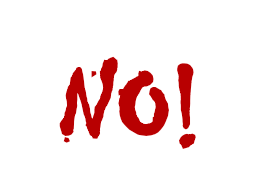Happy Halloween from Submittable! Thanks to everyone that scared us sleepless with rejection horror story submissions.
Though we received too many terrifying tales of rejection horror to post them all here, we’re pleased to share five pieces that piqued our editorial dread:
Better Luck
(Rejection Horror #1)

Some years ago, the major newspaper in my state had a fat Sunday newspaper with a rotogravure insert, and that locally-produced color magazine had a weekly poetry page. (All gone now, dinosaurs lost in the ooze of online.) At the time, that page was my state’s most visible, widely-read, important venue for poems, and ink-stained wretches in attics everywhere talked in hushed tones about the power of the single poetry editor, a notoriously finicky and capricious gatekeeper.
The first time I submitted a batch of poems, I got back in the mail a small slip with the newspaper’s masthead at the top, and these handwritten words from that editor: “Better _____ ____ time.” I had to stare at that note for a while before I got it: Better luck next time? What the hell? You mean you were so unimpressed that you couldn’t conjure up the energy to write down all four words of your snarky little “No thanks” note? I felt like someone had kicked the teeth out of my jack-o-lantern’s smile.
The second time I submitted a batch of poems, this was the response: “Better ____ ____ time.” What the hell? You can’t even vary your brush-off? C’mon!
The third time I submitted a batch of poems, the poetry editor bought one. Her note: “Okay. $5.” Boo!
No! A Rejection Success Story
(Rejection Horror #2)

The worst rejection letter I ever received came from a small Colorado-based “literary” magazine that billed itself as prime literature for the doctor’s office waiting room. Literally, it was something people read while waiting to get their tonsils swabbed for a strep test. Moreover, it was spreading streptococcal bacteria to the next unsuspecting reader/patient, and then to the one after that.
What I’m trying to say here, gently, is that I wasn’t aiming all that high.
Even so, I’d done my homework by reading the publication and developing a feel for what the editors liked. I selected a piece that fit their style. “Under the Rug” told the story of an elderly couple who sought paranormal “exterminators” for their haunted home’s infestation, and I thought the story was perfect for the publication’s October issue. Alongside a professional query letter, I mailed out a still-warm manuscript. For a few days, I basked in the pleasant possibility that another story would be published.
Less than a week later, the S.A.S.E. arrived in my mailbox.
At once, I knew that a single sheet of paper was inside—never a good sign. I tore it open, expecting the usual: “Thank you for your submission. Unfortunately, we do not feel it is right for our publication. We wish you the best of luck placing it elsewhere.” These form rejection letters are unsigned and grainy from years of having been photocopied off other yellowing photocopies of the first form rejection letter ever written, no doubt penned and printed by Gutenberg himself. Like most writers, I’ve received my fair share of them.
What I found inside, however, was something altogether different. In my hands was the same query letter I’d mailed out only days earlier. Right underneath my signature, the editor had written in two-inch-tall block letters with a red Sharpie marker:

It’s difficult to describe what went through my mind and in what order. I remember an initial flash of mortification, then looking around to see if someone was filming my reaction for an updated Candid Camera series, and finally, righteous indignation. Would it have killed the editor to have been polite? He’d solicited submissions in Novel & Short Story Writer’s Market. Why respond like I’d shown up selling vacuum cleaners door-to-door just as dinner was being put on the table?
Rejection sucks in general, but it especially blows when delivered via sucker-punch from a decidedly mediocre publication. My friend Erin, a talented poet, once shared her own frustration when her work was rejected by a so-called literary magazine that was—and I kid you not—printed on typing paper and then crookedly stapled with such an amateurish aplomb that it made me, a former print production manager for a Fortune 500 company, want to throw its editors into a cage and spray them with a fire hose until they screamed for mercy.
At least they’d had the decency, however, to be polite to her.
In the end, I did manage to make substantial lemonade out of this mock-horror story. I started with an author blog post, which I then adapted for publication on NLAPW’s blog and then re-published in an anthology called Creative Genius: The Inspirational Wisdom of Pen Women (Pen Women Press, 2017). And if you’re reading these words right now, it means I’ve just succeeded in placing it one more time.
Quite possibly, this the most successful rejection ever.
Wicked Spirits, Be Gone!
(Rejection Horror #3)

I am haunted
by the spirits of submissions past.
They hover over me,
ghastly reminders of my own insecurities.
Every time I turn around,
and they have multiplied
like waterlogged Mogwais.
Stop looking at me
with those piercing eyes.
They laugh and mumble
in a demonic language indecipherable.
I stare at the apparitions glaring back
and wish for escape
from their soul-stealing chatter.
Their grotesque mockery is omnipresent.
Sanity is impossible
unless I learn to block out the voices.
I may or may not have heard
among the tongues of tormentors
a whisper drifting in with the wind:
Lessons, not rejections.
Previously Published
(Rejection Horror #4)

Fifteen years ago or so, back when submissions were primarily paper and S.A.S.E., I sent a batch of poems to a tiny literary magazine in the midwest. I got back a very gracious letter from the editor/publisher telling me he rarely was impressed by work sent over the transom but in this case he was surprised. The editor asked to publish one of the poems, and, of course, I was flattered and happy to place the poem.
The months went by, as they do, and I was asked by the publisher of another small magazine for a manuscript they could put out in their new line of chapbooks. The poem they had published in their magazine was part of a series, the poem accepted by the other magazine being another in the series. This would be a great opportunity to see the series under one cover.
There is often a long space between acceptance and publication. I listed the first magazine among others on the chapbook’s acknowledgements page, wondering at that time if perhaps the first magazine had published the poem they’d asked for but lost track of my address. Maybe they had closed up shop. Finally, I wrote the editor a gentle inquiry.
The reply I received was snippy. “I got your chapbook,” the editor said, “sent to me by the chapbook publisher. I thought it was strange that you listed my magazine in your acknowledgments. I never accepted any poems from you.”
Nonplussed, I went to my files and pulled out the acceptance letter. I reread its friendly and admiring tone, so different from the letter I’d just received. I copied the letter and sent it back to the editor.
The next reply was just as snippy. “I don’t remember this letter,” the editor said. “But I guess I wrote it. I won’t publish your poem. I don’t put previously published work in my magazine.”
Revealing my Greatness
(Rejection Horror #5)

There I was, the spring semester of my freshman year in college. I had a drawer full of poems that were going to be the beginning of the greatest literary career in history, only I was incredibly nervous about sharing my greatness with the world. I walked past the submission box (it was 2000 so we didn’t do stuff via the internet back then) of my college’s literary magazine, The Sequoia Review, every day, thinking of the earth-shattering moment when I would drop my work in and splash onto the literary scene, forever altering the world of letters. But I just couldn’t bring myself to do it… surely I wasn’t nervous about the quality of my writing?
Anyway, the deadline came and went, and I didn’t submit anything. I felt awful about myself. Why couldn’t I submit anything?
Then, a week later, a chance at redemption arose. Outside of The Sequoia Review’s offices, a sign popped up that said that they were short on submissions and that the deadline had been extended. This time I plucked up my courage and ran—ran—back to my dorm room, grabbed five poems, filled out the submission form, and triumphantly thrust them into the submissions box.
I waited and waited… anyone who has ever submitted anything knows the feeling. Then finally it came: my first rejection letter. Not only had I been rejected, but I was rejected by a student publication desperate for submissions. Apparently they weren’t desperate enough for my poems. In fact, when that issue came out, it was noticeably shorter than previous ones.
I’m embarrassed to admit it now, but it was years before I submitted something somewhere else.
***
Please join us next Halloween for more rejection horror. In the meantime, if you write about publishing, creativity, and digital media, we’d love to consider your work. Or visit rejection horror past and future.